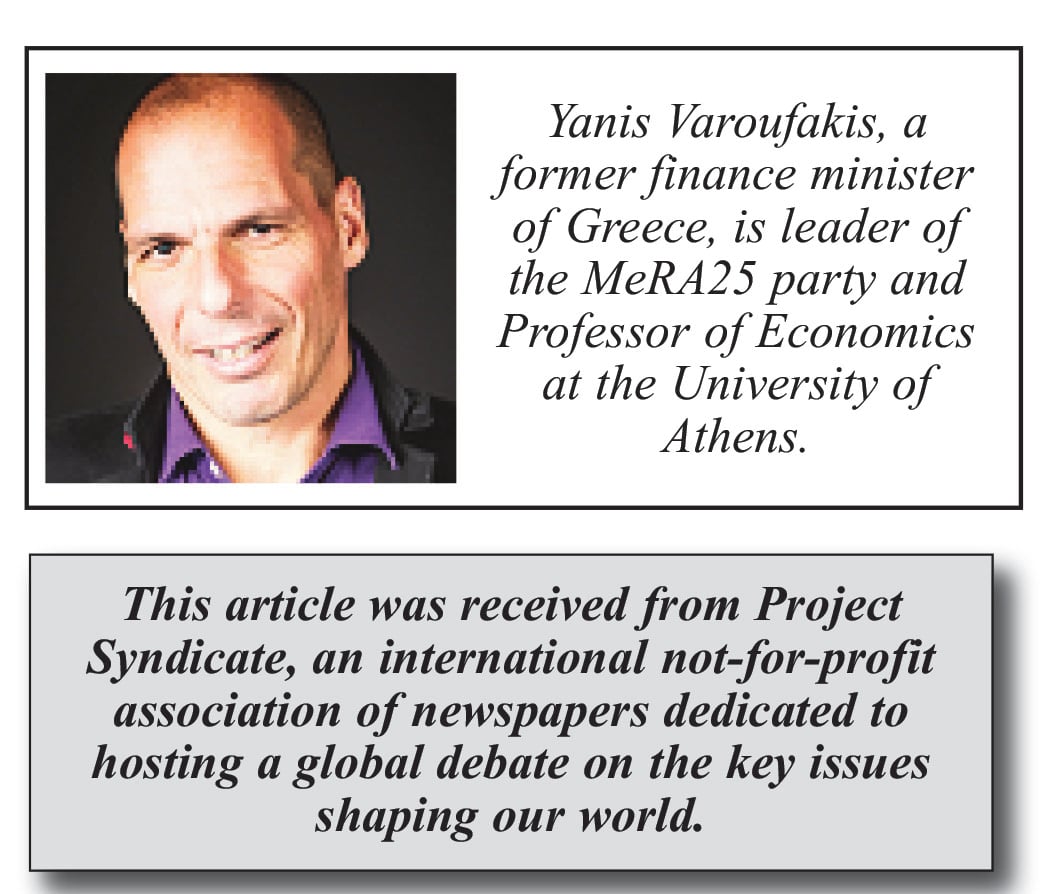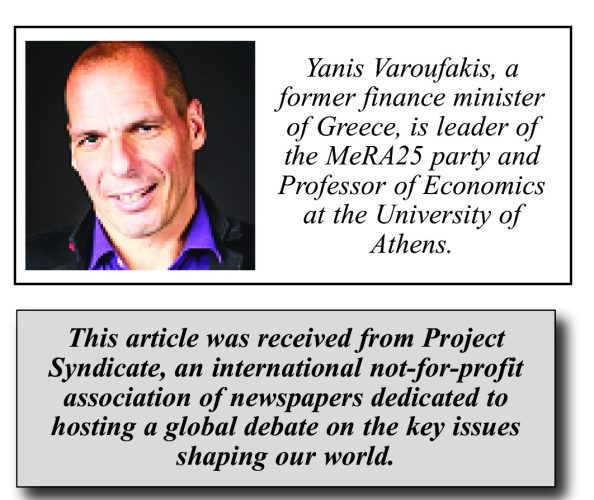ATHENS – When the euro crisis was young, some of us became convinced that a massive public green investment program was necessary to save Europe from economic stagnation and from the ultra-right that would emerge as stagnation’s sole beneficiary. In 2017, I put a figure on what was needed: up to 5% of Europe’s total income for investment in green energy and sustainable technologies. Since we knew then, as we know now, that neither the European Union’s member states nor the EU’s budget could afford this sum, I proposed a novel way to finance it through European Investment Bank (EIB) bonds guaranteed by the European Central Bank (ECB).
When I presented this idea to the committee of European finance ministers and central bankers in 2015, it was never rejected because it was never debated. Not giving up, in 2019 I ran for the European Parliament elections in support of DiEM25’s Green New Deal for Europe, arguing that the 5% green investment campaign could be “for progressives what immigration and racism is to the rightists.” Instead, the incoming European Commission, under Ursula von der Leyen, adopted a hopelessly underfunded so-called Green Deal that was macroeconomically insignificant and, as I had warned, environmentally duplicitous.
Then came COVID-19. Europe’s leaders responded with a recovery fund, formally known as NextGenerationEU. As I predicted, the fund was not only another macroeconomically irrelevant program but also the death knell for any prospect of a European fiscal union with which to fund the investments essential to Europe’s future. EU officials, insisting that NextGenerationEU was all that Europe needed, rejected my proposal for public investments in the order of 5% of European income as “fiscally irresponsible” and “politically infeasible.”
Earlier this month, Mario Draghi, the former President of the European Central Bank and former Italian Prime Minister, delivered a much-anticipated report to von der Leyen, now at the beginning of her second term as Commission president. Its theme? Unless Europe takes certain steps, “it will have lost its reason for being.”
And what steps must Europe take, according to Draghi? The central pillar of his report is a proposal that 5% of Europe’s total income should fund a public green investment program, using new common debt. Immediately, journalists from across Europe called me to ask if I felt vindicated. “No, I feel devastated,” I replied. “But,” one of them insisted, “isn’t late better than never?”
No, it isn’t, because for Europe, it is not merely late, but too late. The reason goes beyond the (at least) €3 trillion ($3.3 trillion) of investment in green technologies that Europe has failed to make since 2019, thus causing it to fall far behind China and the United States. Simply put, the opportunity to channel 5% of Europe’s income into green investments, even at this late stage, is now gone. It has evaporated, disappeared. While biding its time, Europe shifted from a deflationary dynamic to an inflationary one, and this has closed the window of opportunity that was open until 2020. Let me explain.
My 2019 proposal called for the EU Council to give the EIB the green light to issue around a half-trillion euros worth of its own 30-year bonds annually to fund green investments across Europe. At the time, the ECB was already buying bonds to defeat the deflation wreaking havoc in Germany (for example by pushing savers’ interest rates to zero and below).
All the ECB had to do was to declare that it would be buying these fresh EIB bonds (rather than German government bonds). That would have meant cheap loans, equivalent to 5% of Europe’s total income, to invest without burdening either the budgets of member states or the EU. By now, productivity would be much higher, German industry would not be in its current sorry state, and the increased economic activity would have replenished our revenues with a surge of taxes.
Today, it is too late to do anything like this. After years of negligible investment, Europe’s supply side shrank. As a result, inflation, triggered by the pandemic, forced the ECB to sell bonds – thus closing the window for large ECB-backed EIB-bond issues.
Nor can the European Commission issue its own bonds to the level of 5% of Europe’s income, as it did in order to fund NextGenerationEU, because these Commission bonds are mistrusted both by investors and by member-state governments. The former know that the Commission cannot commit to raising its own resources or the size of member states’ contributions to the EU budget, while the latter view the bonds as a harbinger of pressure to increase member states’ contributions to future EU budgets.
The sole alternative for funding the necessary investment program would be a proper federation with a democratically elected federal government and a federal budget at least 30 times that of the current EU budget, plus the power to borrow and to tax. Unfortunately, this is precisely the solution that the inane handling of the euro crisis and the pandemic has pushed into the realm of political impossibility.
In short, Draghi’s report will be honored in the breach, not in the observance. Paying lip service to it, the Commission will repurpose some of the unspent recovery fund. In reality, it will bury the report’s main recommendation. Does Draghi not know this?
I suspect that he does. His report reads like a swansong and a renunciation of personal blame for Europe’s degeneration into a museum of bygone industries and excellent reports that were praised to the skies before being shelved.
Copyright: Project Syndicate, 2024.







